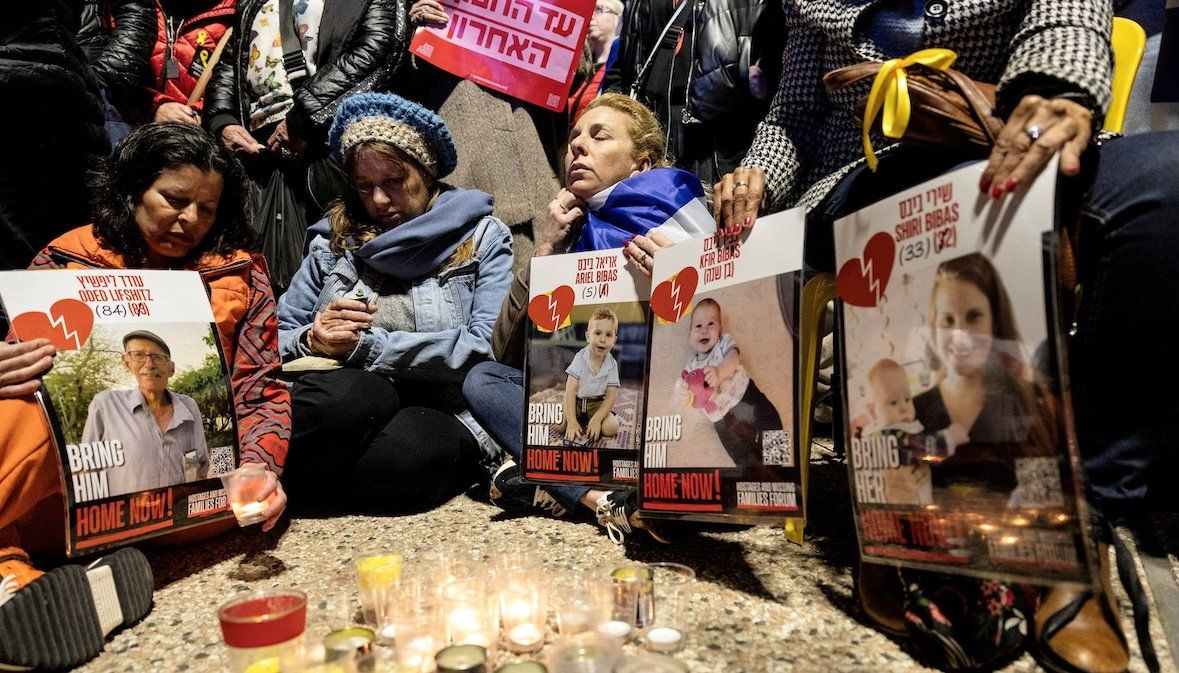Hard Numbers: Israel mourns as bodies return home, Trump stokes pessimism and optimism, McConnell officially retires, Canada calls cartels “terrorists,” Archaeologists make major find in Egypt
Israelis sit together as they light candles and hold posters with the images Oded Lifschitz, Shiri Bibas, and her two children, Kfir and Ariel Bibas, seized during the deadly Oct. 7, 2023 attack by Hamas, on the day the bodies of the deceased hostages were handed over under by Hamas on Feb. 20, 2025.
3 of 4: On Thursday, Hamas returned the bodies of what they said were four hostages, including two small children and their mother, Shiri Bibas, as well as an elderly activist. The bodies of Kfir and Ariel Bibas, and Oded Lifshitz, were returned to Israel in a grim spectacle involving black caskets and masked militants, but tests confirmed later that the fourth casket was holding anonymous remains, not the body of Shiri Bibas. Israeli Prime Minister Benjamin Netanyahu called it a “cruel and malicious violation” of the ceasefire agreement and vowed revenge. Hamas said that the mother’s remains must have been mixed up with others after an Israeli strike. Meanwhile, following explosions on three empty buses in central Israel — nobody was injured in the apparent terror attack — on Thursday night, Netanyahu has ordered an intensive military operation in the West Bank.
53: How’s Donald Trump doing with the public? 53% of respondents in a new CNN poll said they feel either “pessimistic” or “afraid.” Nearly two-thirds said the president hasn’t gone “far enough” to address inflation, while just over half said he had so far gone “too far” in his use of executive power. The partisan split is as stark as ever, with nearly 9 in 10 Republicans saying they are “enthusiastic” or “optimistic” about Trump’s second presidency.
18: After 18 years in the Senate as both majority and minority leader, Mitch McConnell of Kentucky is officially retiring, he announced Thursday. The wily and cynical tactician drove Democrats nuts with his shrewd use of procedural rules to block their agenda, but he had a complicated relationship with Donald Trump: He enabled the president’s rise even while questioning his assault on establishment norms. McConnell leaves behind a Republican Party that has been reshaped in Trump’s image.
7: Canada on Thursday listed seven transnational crime outfits, including major Latin American drug cartels, as “terrorist” groups. The move, which comes on the heels of similar designations by the US, expands Ottawa’s tools to go after them. In February, PM Justin Trudeau promised this move as part of a deal to postpone US tariffs for 30 days.
103: Long live the king. No, not the US president but Ancient Egyptian Pharaoh Thutmose II, whose tomb was discovered this week in Egypt’s famed Valley of the Kings. It is the first major discovery of its kind since archaeologists found the tomb of Thutmose’s descendant Tutankhamun 103 years ago.